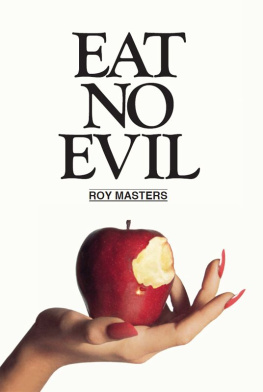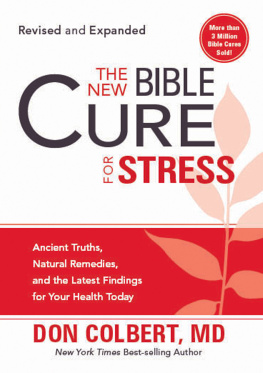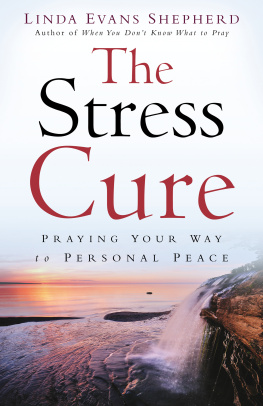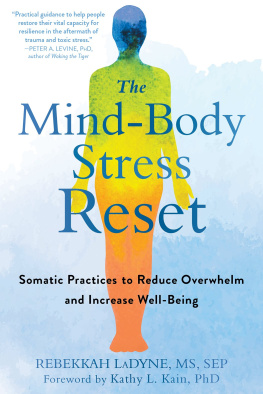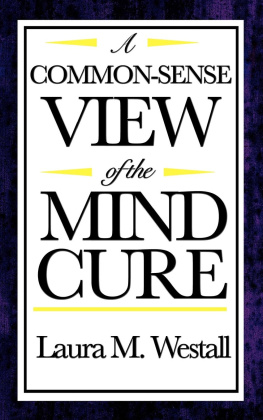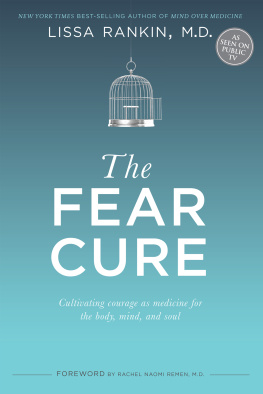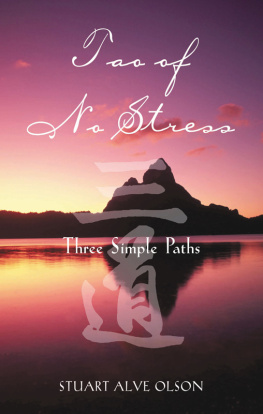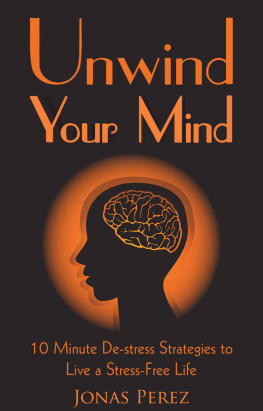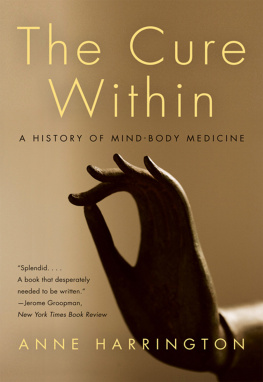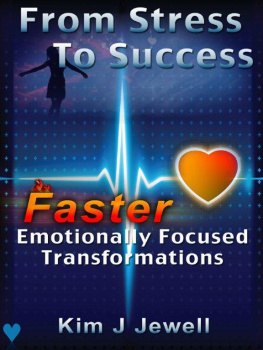Roy Masters - Cure Stress: How Your Mind Will Make You Well
Here you can read online Roy Masters - Cure Stress: How Your Mind Will Make You Well full text of the book (entire story) in english for free. Download pdf and epub, get meaning, cover and reviews about this ebook. year: 2013, publisher: CreateSpace Independent Publishing Platform, genre: Religion. Description of the work, (preface) as well as reviews are available. Best literature library LitArk.com created for fans of good reading and offers a wide selection of genres:
Romance novel
Science fiction
Adventure
Detective
Science
History
Home and family
Prose
Art
Politics
Computer
Non-fiction
Religion
Business
Children
Humor
Choose a favorite category and find really read worthwhile books. Enjoy immersion in the world of imagination, feel the emotions of the characters or learn something new for yourself, make an fascinating discovery.
- Book:Cure Stress: How Your Mind Will Make You Well
- Author:
- Publisher:CreateSpace Independent Publishing Platform
- Genre:
- Year:2013
- Rating:5 / 5
- Favourites:Add to favourites
- Your mark:
- 100
- 1
- 2
- 3
- 4
- 5
Cure Stress: How Your Mind Will Make You Well: summary, description and annotation
We offer to read an annotation, description, summary or preface (depends on what the author of the book "Cure Stress: How Your Mind Will Make You Well" wrote himself). If you haven't found the necessary information about the book — write in the comments, we will try to find it.
Cure Stress: How Your Mind Will Make You Well — read online for free the complete book (whole text) full work
Below is the text of the book, divided by pages. System saving the place of the last page read, allows you to conveniently read the book "Cure Stress: How Your Mind Will Make You Well" online for free, without having to search again every time where you left off. Put a bookmark, and you can go to the page where you finished reading at any time.
Font size:
Interval:
Bookmark:

CURE STRESS: How Your Mind Will Make You Well
Copyright 2012 by Roy Masters
19th edition 2012All rights reserved, including the right to reproduce this book or portions thereof in any form.
Previously published under the title of
HOW YOUR MIND CAN KEEP YOU WELL
Published by The Foundation of Human Understanding
For information, please direct your inquiry to:
The Foundation of Human Understanding
PO Box 1000, Grants Pass, Oregon 97528, USA
Call Toll Free 1-800-877-3227.
Web site: www.fhu.com
Email:
Cover Design: Connie Walser Derek
Library of Congress Catalog Card No. 76-9919
ISBN: 978-1481221047
eBook ISBN: 978-1-63003-551-8
CONTENTS

I am always looking for morally and psychologically sound materials that a chaplain can use to boost a units morale and enhance a soldiers resilience. Your [meditation] is an effective and practical tool that enhances stress management and builds resilience within the mind and emotion of the warrior.
I am especially thankful for the Be Still & Know exercise. It is a good self awareness exercise, comparable to the concept of mindfulness used within the field of empirically researched psychology. I have integrated the exercise into my own personal life as a Christian Chaplain. It assists me in being effective in what I call a listening prayer. My foundational written statement for listening prayer is found in Psalm 46:10, Be still and know I am God. The essence of this spiritual discipline calms my soul, improves my emotional regulation, and enhances my critical thinking skills.
I read a small, but powerful book by Charles Swindoll, Intimacy with the Almighty, several years ago. This book helped transform my life as a war veteran chaplain. The book clarified if I am to be resilient in this difficult world, I must practice the four spiritual disciplines of simplicity, silence, solitude, and surrender. The Be Still and Know exercise helped me practice these four disciplines on a consistent basis.
My average day is filled with phone calls, emails, visits, and deadlines. It seems to me the Blackberry and computer tend to escalate distress signals in my brain as I suffer with an overload of information and tasks to be completed each day. Charles Swindoll said it best when he stated, Everything around us works against reordering and simplifying our lives. Everything! Ours is a complicated and cluttered world. The Be Still & Know exercise used as a listening prayer decreases the clutter in my mind and helps me be more effective and creative in my thought process.
The practice of silence and solitude is at the very core of the Be Still & Know exercise. Learning to be still is one of the most needed, yet most difficult spiritual disciplines today. I remember my struggle when I first became intentional about practicing being still. It was just like the noted Roman Catholic Priest, Henri Nouwen stated, Time in solitude may at first seem little more than a time in which we are bombarded by thousands of thoughts and feelings that emerge from hidden areas of our mind. It can feel like a multitude of confusing thoughts are jumping around in the mind like monkeys in a banana tree. Indeed, this was my experience early on. However, I have observed as I continue the practice of silence and solitude my mind becomes more rested. It also seems my resilience in thinking straight under pressure is improved.
Last of all, there is the issue of surrender. It is an issue of how I want my day to go versus how my day actually does go. A few years ago, while practicing the essence of be still and know, I came to a powerful awareness of what my core daily struggle is. I want my day to go my way. I am finally learning to let go of those things I cannot control or change. I am finally learning that surrendering my days and future to God, not as I would have it, is the most responsible act of obedience I can do. This transformative attitude is a lighter burden for me to carry. It certainly decreases my frustration and distress levels.
I need simplicity, silence, solitude, and surrender in my life to be an effective, resilient military chaplain in todays complex world. Thank you for introducing me to the Be Still & Know CD. It is a helpful tool that can help many other military personnel become the resilient leaders we all need to be in the rapidly changing environment in which we live.
Chaplain (LTC) Phillip L. Pringle
US Army (Southern Baptist)

This book is about a very special form of meditationa rediscovery of an ancient science that provides the answer to the serious problems of our time. Proper understanding of this technique is apparent only after you have submitted yourself to its discipline for a time. How short or how long a time, the author cannot predict. To some, enlightenment comes with sudden intensity. To others it is a gradual unfolding.
What follows is divided into two parts. One part is for conscious reading or listening, in order to bear witness to what you will discover. The other, more vital part is the meditation itself, a process that will raise your conscious self, now dangerously absorbed into its thinking, to the surface of the mind, a place where pure understanding about your problems exists. You simply cannot understand or resolve your problems from the point of being involved with them. Trying to do so causes things to go from bad to worse.
The meditation exercise will also show you how to overcome certain reactions to stress. Through meditation, you will begin to see that all your troubles come from (1) doubting the truth, (2) being ambitious and (3) living out of the emotional upset which results from and perpetuates the first two mistakes. Your failing attempts to deal with symptoms and the ways youve compensated for your guilt have only made matters worse.
The meditation will help you realize that any attempt to rationalize or analyze an emotional complex only adds to the severity of the problem. The author is well aware of the controversial nature of these statements and politely requests the reader to withhold judgment until some experience with the meditation is gained.
Most people rebel at good advice that opposes their secret ambitions, and they will recoil when you talk about their faults. Alcoholics will rebel when you criticize their drinking, even when you try to help them. We all abhor outer direction (being told what to do), for the natural inclination of the soul is toward ultimate self-government.
For example, fixed on the wall of an elevator there is a sign: Gentlemen, please remove your hats when ladies are present. The first man to see it becomes angry; the sign is insinuating that he has no manners, so he rebels by leaving his hat on. A second man enters and becomes self-conscious, noticing that the ladies also see the sign. Reluctantly, he removes his hat.
The first man might have had good manners, but when he saw the sign he rebelled with bad manners (which bothers his conscience). The second man removed his hat only through embarrassment, not because he really wanted to, and so felt thoroughly uncomfortable all the time he was in the elevator.
Notice that both men have reacted badly to the sign. Both men lost control, as well as respect for themselves and the ladies in the elevator. Neither of these men did the right thing, and this outcome was the secret intention of the do-gooder who placed the notice. Now, the one who would have been right is wrong, and the unmannered person is the one who appears to be well mannered. Moreover, the meddling problem-solver has not solved the problem, but only made things worse. The frustration caused by his interference creates a greater need for his services and provides him with an inspiring illusion of worthiness. In the process, he has created a full-time job away from looking at his own miserable self.
Next pageFont size:
Interval:
Bookmark:
Similar books «Cure Stress: How Your Mind Will Make You Well»
Look at similar books to Cure Stress: How Your Mind Will Make You Well. We have selected literature similar in name and meaning in the hope of providing readers with more options to find new, interesting, not yet read works.
Discussion, reviews of the book Cure Stress: How Your Mind Will Make You Well and just readers' own opinions. Leave your comments, write what you think about the work, its meaning or the main characters. Specify what exactly you liked and what you didn't like, and why you think so.


